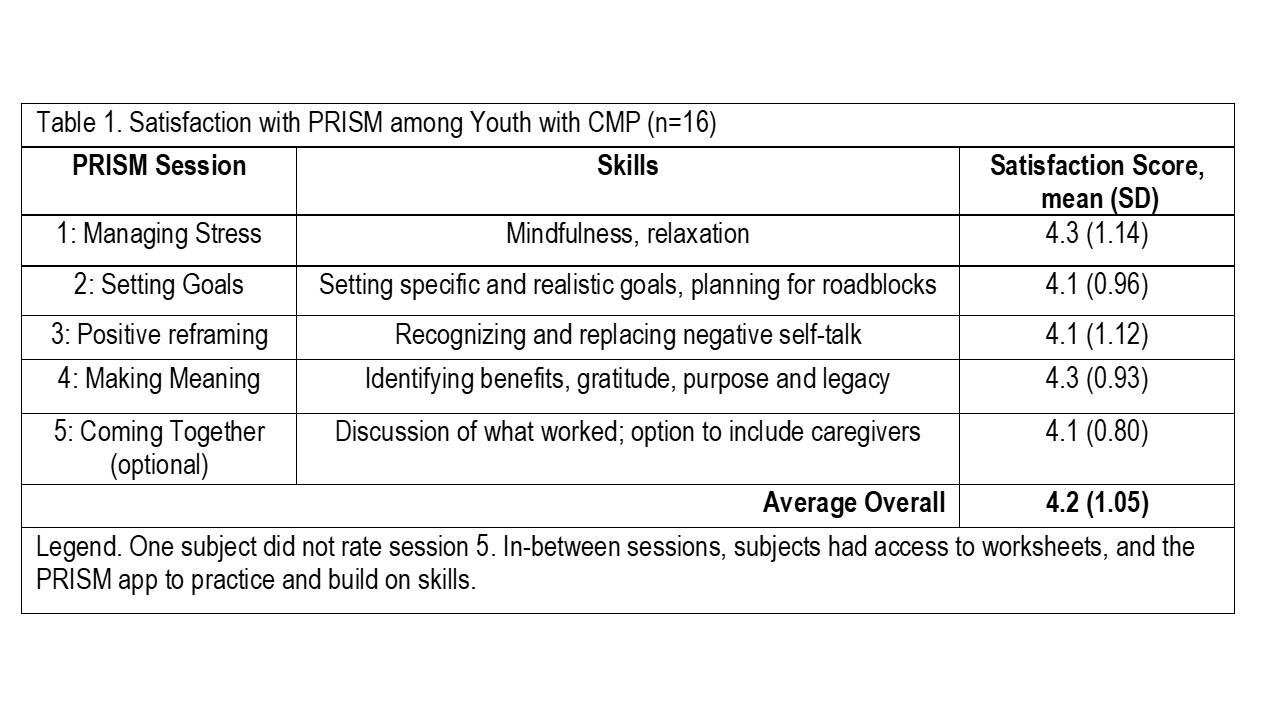Session Information
Date: Tuesday, November 9, 2021
Title: Pediatric Rheumatology – Clinical Poster III: Miscellaneous Rheumatic Disease (1614–1644)
Session Type: Poster Session D
Session Time: 8:30AM-10:30AM
Background/Purpose: Chronic musculoskeletal pain (CMP) affects up to 40% of youth and is associated with physical disability and psychological distress. Resilience coaching interventions, such as Promoting Resilience in Stress Management (PRISM), are well-established for reducing stress and building resilience in pediatric chronic illness. Our previous research demonstrated that self-perceived resilience is low among youth with CMP and resilience correlates with symptom severity. It is not known whether youth with CMP would participate in and benefit from resilience coaching. We therefore aimed to 1) assess the feasibility and acceptability of PRISM and 2) explore whether it results in improved clinical outcomes for adolescent CMP.
Methods: We conducted a single center pilot study of PRISM among youth with CMP. Eligible participants were English-speaking youth ages 12-17 years diagnosed with CMP seen for initial evaluation and one of their caregivers. Youth with inflammatory, neurologic or oncologic/hematologic diagnoses or cognitive impairments were ineligible. PRISM is a manualized, skills-based intervention consisting of four (~30 minute) required and one optional one-on-one sessions scheduled every 1-2 weeks. Participants chose mode of delivery: in-person, video chat, or telephone. Youth completed pre- and post- intervention surveys. Both patients and caregivers participated in semi-structured interviews upon study completion. Feasibility of intervention delivery was defined as ≥70% of subjects completing all 4 required sessions. The intervention was defined as acceptable if the mean satisfaction score for patients was ≥ 3 on a 5-point Likert scale (1=very dissatisfied and 5=very satisfied). We also administered the Acceptability of the Intervention Measure (AIM) (1=completely disagree and 5=completely agree) and defined acceptability as a mean AIM ≥ 3. All qualitative interviews were transcribed verbatim and qualitative analyses are ongoing.
Results: We approached 37 eligible patients and enrolled 19 (51%). High feasibility in intervention delivery was demonstrated with 84% (n=16) of youth having completed all study visits. One participant completed session 1 and one participant completed sessions 1 and 2 before early discontinuation; another never started PRISM. Video visit (69%) was the preferred mode of delivery, followed by telephone (25%). High overall satisfaction and acceptability were found. Mean participant satisfaction was 4.19 (SD 1.05) and the average satisfaction score for each session was >4 (Table 1). Similarly, the mean AIM was 4.25 (SD 0.99). Table 1 shows preliminary changes pre-post treatment in clinical outcomes demonstrating increased resilience and clinically relevant outcomes.
Conclusion: Resilience coaching is a feasible and acceptable adjunctive treatment for youth with CMP. Video visit was the preferred delivery format. Exploratory analyses suggest improvements in resilience and clinically relevant outcomes. Given high feasibility and acceptability, we plan to move forward to conduct a future randomized controlled trial of PRISM using videoconferencing as a delivery platform for this vulnerable patient population.
 Legend. PRISM = Promoting Resilience in Stress Management. CMP = chronic musculoskeletal pain. MCID = Minimal clinically important difference. PROMIS PGH7=Patient Reported Outcome Measure Information System pediatric global health 7 (T-score with 50 as mean in reference population and 10 is SD). K6=Kessler-6 Psychological Distress Scale, with scores ≥7 consistent with high distress and those ≥ 13 meet criteria for serious or debilitating psychological distress. FDI=Functional disability inventory: No/minimal (0_12), Mild (13_20), Moderate (21_29), and severe (≥30). CD-RISC_10=Connor Davidson Resilience Scale 10 item (40) with higher scores indicating greater resilience. PCS-C=Pain Catastrophizing Scale for Children. PTSD=post-traumatic stress disorder. WPI=Widespread pain index and SSS=symptom severity scale as per the ACR criteria for fibromyalgia syndrome. UCLA=University of California Los Angeles.
Legend. PRISM = Promoting Resilience in Stress Management. CMP = chronic musculoskeletal pain. MCID = Minimal clinically important difference. PROMIS PGH7=Patient Reported Outcome Measure Information System pediatric global health 7 (T-score with 50 as mean in reference population and 10 is SD). K6=Kessler-6 Psychological Distress Scale, with scores ≥7 consistent with high distress and those ≥ 13 meet criteria for serious or debilitating psychological distress. FDI=Functional disability inventory: No/minimal (0_12), Mild (13_20), Moderate (21_29), and severe (≥30). CD-RISC_10=Connor Davidson Resilience Scale 10 item (40) with higher scores indicating greater resilience. PCS-C=Pain Catastrophizing Scale for Children. PTSD=post-traumatic stress disorder. WPI=Widespread pain index and SSS=symptom severity scale as per the ACR criteria for fibromyalgia syndrome. UCLA=University of California Los Angeles.
To cite this abstract in AMA style:
Gmuca S, Weiss P, McGill M, Sonagra M, Sherry D, Cronholm P, Gerber J, Palermo T, Young J, Rosenberg A. Preliminary Results from a Pilot Feasibility and Acceptability Trial of Resilience Coaching for Adolescent Chronic Musculoskeletal Pain [abstract]. Arthritis Rheumatol. 2021; 73 (suppl 9). https://acrabstracts.org/abstract/preliminary-results-from-a-pilot-feasibility-and-acceptability-trial-of-resilience-coaching-for-adolescent-chronic-musculoskeletal-pain/. Accessed .« Back to ACR Convergence 2021
ACR Meeting Abstracts - https://acrabstracts.org/abstract/preliminary-results-from-a-pilot-feasibility-and-acceptability-trial-of-resilience-coaching-for-adolescent-chronic-musculoskeletal-pain/

